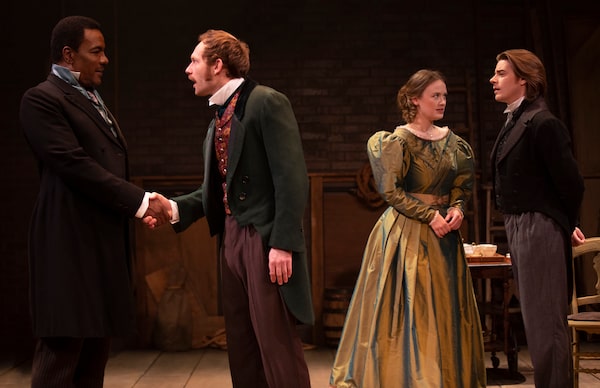
Amelia Sargisson, left, and Allan Louis star in Red Velvet.John Lauener/Crows theatre
- Title: Red Velvet
- Written by: Lolita Chakrabarti
- Director: Cherissa Richards
- Actors: Allan Louis, Kyle Blair, Ellen Denny, Amelia Sargisson
- Company: Crow’s Theatre
- City: Toronto
- Year: Runs to Dec. 18
Critic’s Pick
Ira Aldridge (1807-1867) was not only the best-known Black actor of his time in Europe. He was also, according to his most recent biographer Bernth Lindfors, “the most visible Black man in Europe in the middle of the nineteenth century.”
Red Velvet, a 2012 play by the British playwright Lolita Chakrabarti now getting a robust Toronto premiere at Crow’s Theatre, makes Aldridge visible on stage once more for an audience of today.
Allan Louis, a prominent ensemble member at the Shaw Festival, plays Aldridge at two ages. In the (somewhat extraneous scenes) that frame the play, he is seen in the final days of his life on tour playing King Lear in Eastern Europe.
It’s the insistent questioning of a local Polish journalist (Amelia Sargisson) about his lack of recent London stage appearances that then pulls the action back to that city in 1833.
In that year, Aldridge broke ground for Black actors by playing Othello at Theatre Royal in Covent Garden, as a replacement for the stage star Edmund Kean who had collapsed on stage and later died.
As Kean’s company, all white, gathers to discover who will step in to that role, there is unrest in the London streets related to the recent passage of the Slavery Abolition Act.
The young Henry Forrester (an amusing Nathan Howe) is giddy about this moment of progress, while Bernard Warde (Patrick McManus) grumbles about how he doesn’t care how sugar gets in his tea as long as it gets there. (A Black servant named Connie (Starr Domingue) is on hand as well to serve that tea – listening to everything and largely ignored.)
When French theatre manager Pierre Laporte (Kyle Blair) announces that his old friend Aldridge will be the new Othello, it sets off reverberations throughout the company and eventually around the city.

Director Cherissa Richards and another enviable Crow’s Theatre ensemble bring Red Velvet to the Toronto stage smoothly, successfully ironing out the kinks in the structure of the script.John Lauener/Crows theatre
The casting drives a wedge between Kean’s son, Charles Kean (Jeff Lillico), who has been playing Iago and is strongly opposed to Aldridge’s casting, and his fiancée, Ellen Tree (Ellen Denny), who has been playing Desdemona and is excited about the new leading man.
But while an audience sells out Aldridge’s debut, the theatre critics, as they so often have through history, start serious trouble by airing their prejudices in their overnight reviews. One, and this is taken from an actual critical assessment of Aldridge’s work that appeared in The Times of London, alleges that “owing to the shape of his lips, it is utterly impossible for him to pronounce English.” (The Times was one of a number of British newspapers at the time that took money from the pro-slavery lobby – and Lindfors notes in his biography that influence may have have extended into reviews of Aldridge’s work.)
While, in Red Velvet, Chakrabarti has chosen to avoid the long arc of the bio-play and focus on a moment in Aldridge’s exceptional life and career that climaxed in dramatic conflict, she also provides a fascinating behind-the-scenes peek into his and others stage practices of the time.
It is touching to watch Louis’s Aldridge deal with his first-night nerves with his wife (Sargisson again) like any other theatre artist of any time – and a pleasure to watch his craft enacted in rehearsals as he and Tree work out their differing acting techniques. Chakrabarti’s script, too, deftly illustrates how these questions of “style” – like how much an actor should bring himself to a role as opposed to escape into it – are loaded when you are visibly different.
Director Cherissa Richards and another enviable Crow’s Theatre ensemble bring Red Velvet to the Toronto stage smoothly, successfully ironing out the kinks in the structure of the script. Louis is a layered Aldridge -– charisma caked over insecurity – and surrounded by vivid, playful sketches by the others, especially Sargisson as a series of underwritten women..
Samuel Taylor Coleridge famously wrote of the elder Kean that: “To see him act, is like reading Shakespeare by flashes of lightning.” Chakrabarti’s play (which originally premiered with her husband, the well-known Royal Shakespeare Company veteran Adrian Lester, in the lead) aims to make the lesser-known Aldridge as renowned for, as a character who later betrays him puts it, “the thunder that follows.”

Louis, right, plays a layered Ira Aldridge – charisma caked over insecurity – and surrounded by vivid, playful sketches by the others.John Lauener/Crows theatre
Her play, performed in Canada, however, puts British stage history and Shakespeare once again at the centre of our own theatrical culture. It is interesting to see Red Velvet so closely on the heels of the Studio 180/Mirvish production of Paula Vogel’s Indecent, which followed a Yiddish play called God of Vengeance on a triumphant European tour and then to a controversial, censored run in New York.
The lesson of the pair of them together is that the West End and Broadway are often the most reactionary places to put on a play – and yet, our attention is still drawn there even when excavating the supposedly hidden history of the past. It’s a paradox worth noting.